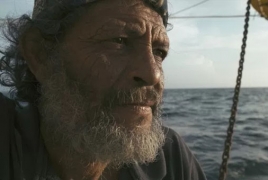
Executive produced by Alejandro Gonzalez Inarritu (“The Revenant”), Jose Alvarez’s poignant docu “The Gaze of the Sea” (“Los Ojos del Mar”) turns on a prostitute who makes it her mission to help the families of shipwrecked fishermen lost at sea, Variety said.
“Gaze” is produced by Julio Chavezmontes’ Piano, the Mexican lead-producer of Emiliano Rocha Minter’s debut feature “We are the Flesh,” another move backed by Gonzalez Inarritu, albeit in terms of endorsement and promotion. Alvarez’s shingle Alacran con Alas and Germany’s Sutor Kolonko are co-producers.
“Alejandro is an old childhood friend and we both worked in radio, too,” said Alvarez. “He has always liked my documentaries; he finds them – inexplicably – more complicated to make than fiction features,” he mused.
After its debut in Morelia’s pix-in-post program Impulso where it won a berth on roving documentary festival Ambulante, and a Mexican premiere at the Guadalajara Int’l Film Fest, “Gaze of the Sea” is having its world premiere at Switzerland’s prominent docu fest, Visions du Reel (April 21-29), one of just four Latin American feature-length docs in competition.
In “Gaze” Alvarez sought to steer away from the somewhat anthropological angle of his previous docus (“Canicula,” “Flores en el Desierto”) but it also deals with his recurring theme of faith, Variety said.
“I had always wanted to shoot in Veracruz again [after “Canicula”] and this time go out to sea,” said Alvarez. He found his subject at the pier, who while plying her trade in the oldest profession, also charges phones and sells food etc. at the port. “She had heard about a shipwreck and wanted to help these families get closure as the bodies had never been recovered,” he said. “Gaze” also reveals the back-breaking work involved in shrimp trawling.
His next project will focus even further afield, Siberia, where he dwells on distances in terms of culture and time. “Its tentative title is ‘Lazaro’ to imply re-emerging cultures.”

